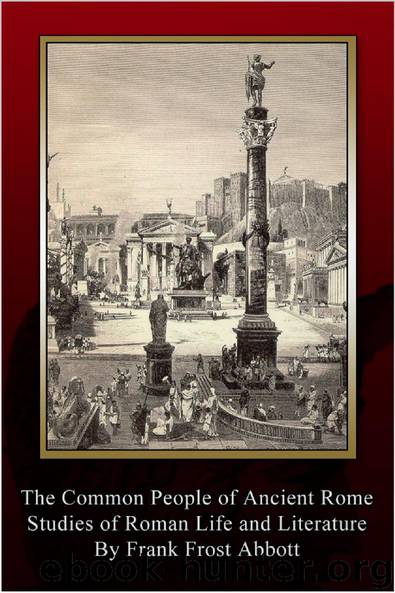The Common People of Ancient Rome by Frank Frost Abbott

Author:Frank Frost Abbott
Language: eng
Format: epub
Tags: classic, classics, study, ancient, roman, romans, society, literature, life, history
ISBN: 9781781664377
Publisher: Andrews UK Limited 2012
Published: 2012-06-12T00:00:00+00:00
Diocletian's Edict and the High Cost of Living
The history of the growth of paternalism in the Roman Empire is still to be written. It would be a fascinating and instructive record. In it the changes in the character of the Romans and in their social and economic conditions would come out clearly. It would disclose a strange mixture of worthy and unworthy motives in their statesmen and politicians, who were actuated sometimes by sympathy for the poor, sometimes by a desire for popular favor, by an honest wish to check extravagance or immorality, or by the fear that the discontent of the masses might drive them into revolution. We should find the Roman people, recognizing the menace to their simple, frugal way of living which lay in the inroads of Greek civilization, and turning in their helplessness to their officials, the censors, to protect them from a demoralization which, by their own efforts, they could not withstand. We should find the same officials preaching against race suicide, extravagant living, and evasion of public duties, and imposing penalties and restrictions in the most autocratic fashion on men of high and low degree alike who failed to adopt the official standards of conduct. We should read of laws enacted in the same spirit, laws restricting the number of guests that might be entertained on a single occasion, and prescribing penalties for guests and host alike, if the cost of a dinner exceeded the statutory limit. All this belongs to the early stage of paternal government. The motives were praiseworthy, even if the results were futile.
With the advent of the Gracchi, toward the close of the second century before our era, moral considerations become less noticeable, and paternalism takes on a more philanthropic and political character. We see this change reflected in the land laws and the corn laws. To take up first the free distribution of land by the state, in the early days of the Republic colonies of citizens were founded in the newly conquered districts of Italy to serve as garrisons on the frontier. It was a fair bargain between the citizen and the state. He received land, the state, protection. But with Tiberius Gracchus a change comes in. His colonists were to be settled in peaceful sections of Italy; they were to receive land solely because of their poverty. This was socialism or state philanthropy. Like the agrarian bill of Tiberius, the corn law of Gaius Gracchus, which provided for the sale of grain below the market price, was a paternal measure inspired in part by sympathy for the needy. The political element is clear in both cases also. The people who were thus favored by assignments of land and of food naturally supported the leaders who assisted them. Perhaps the extensive building of roads which Gaius Gracchus carried on should be mentioned in this connection. The ostensible purpose of these great highways, perhaps their primary purpose, was to develop Italy and to facilitate communication between different parts of
Download
This site does not store any files on its server. We only index and link to content provided by other sites. Please contact the content providers to delete copyright contents if any and email us, we'll remove relevant links or contents immediately.
Housekeeping by Marilynne Robinson(3450)
The Poetry of Pablo Neruda by Pablo Neruda(3402)
Papillon (English) by Henri Charrière(3301)
World without end by Ken Follett(3029)
TCP IP by Todd Lammle(2667)
Fluent Forever: How to Learn Any Language Fast and Never Forget It by Gabriel Wyner(2478)
The Rape Of Nanking by Iris Chang(2342)
The Alchemist by Paulo Coelho(2322)
How Proust Can Change Your Life by Alain De Botton(2285)
The Partner by John Grisham(2005)
Two lives by Helen Naylor(1964)
Hitler by Ian Kershaw(1773)
Yerma by Federico García Lorca(1659)
Smilla's Sense of Snow by Peter Hoeg(1632)
Merriam-Webster's Pocket Dictionary by Merriam-Webster(1581)
Sophie's World by Jostein Gaarder(1574)
Il cavaliere inesistente by Italo Calvino(1569)
Deep Writing by Eric Maisel(1541)
Twilight of Idols and Anti-Christ by Friedrich Nietzsche(1511)
